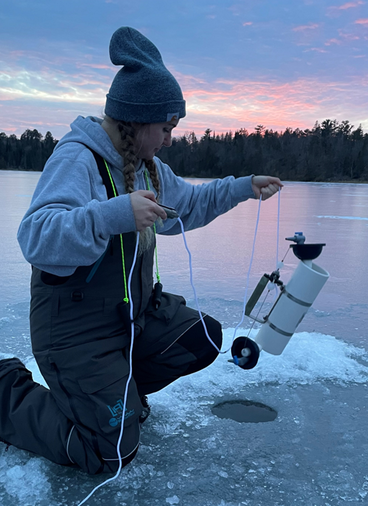
Believe it or not, fish can hear you. “Sound actually amplifies underwater if it breaks through the water’s surface tension,” says Leah Glimsdal, a University of Minnesota Duluth (UMD) graduate student studying how underwater acoustics affect fish communities. You can imagine how terrifying it might be for fish when people who go ice fishing drill their holes. “They usually get scared right away,” says Glimsdal. “We call that an escape response.”
Her experimental design is simple: drill a hole, submerge a camera and a water-proof microphone in the icy lake water, then wait over an hour to drill a second hole nearby. Despite being initially scared off by the drill, many fish (or more fish than were initially there) quickly returned to the site of the drilling. Glimsdal is still unsure why.
“Around two minutes after drilling, I see seven times more fish than before drilling,” says Glimsdal. She thinks they’re coming back to feed on zooplankton. These tiny aquatic organisms are normally found near the top of the water column but are much lower post-drilling. It’s possible they get stuck in a current created by the drill. “It’d be like us swimming in molasses — they’re not able to swim out.”
Glimsdal, hopes to continue investigating how sound influences aquatic species. “Fish use sound a lot. They use it for mating, predator and prey detection, finding habitats,” she says. “Louder sounds can mask their ability to hear those sounds.” — Adara Taylor